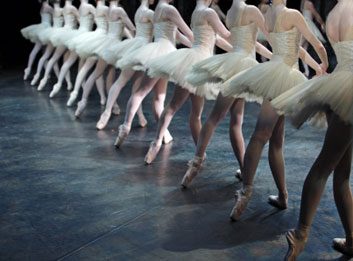Debate: Do dramatic celebrity weight transformations encourage eating disorders?
When Natalie Portman took the stage last night to accept the Academy Award for Best Actress, she looked absolutely radiant

When Natalie Portman took the stage last night to accept the Academy Award for Best Actress, she looked absolutely radiant in a chic purple gown by Rodarte, complete with that mom-to-be "glow." It was a far cry from the 90-pound, ultra-thin Portman that audiences watched on the big screen in Black Swan. And yet, on some websites right now, it’s the ballerina version of Portman’as well as her co-star, Mila Kunis’that’s being used as "visual motivation" for those who equate thinness with beauty.
They call it "thinspiration." Pro-anorexia groups around the web post photos of emaciated models and oh-so-skinny actresses (and actors) as though the jutting bones and skeletal frames are a kind of "ideal" shape. But as Portman and Kunis have both expressed in interviews, their dramatic weight-loss transformations were not meant to be long-term, nor have they ever endorsed them as a healthy way of life. The same is true of Best Actor winner Christian Bale, who dropped significant weight for his role as drug-addicted boxer Dick Eklund in The Fighter.
"I have no goal of seeing if I can become invisible one day, eat so little that I disappear," said Bale, in an interview with MTV News. "…I didn’t take this job because I went, ‘Oh, there’s a physical transformation needed.’ I always go, ‘Damn! There’s a physical transformation needed!’"
So what can be said about the notion that these Hollywood transformations promote eating disorders and body image issues? Should celebrities be doing more to stress that their methods of preparing for these roles are unhealthy? Do we glorify their unhealthy habits by awarding them with Oscars?
The fact is, anorexia, bulimia, orthorexia‘they’re all serious illnesses that go far beyond images of Natalie Portman and Christian Bale. Some individuals who suffer from eating disorders don’t see the bones and the sunken cheeks and equate it with unhealthiness’they see it as inspirational, as something to aspire to. I’m not about to pretend that Hollywood/advertising/media isn’t weight obsessed, or that we’re not all confronted with the message that thin equals beautiful every single day. But at some point, it’s up to us as individuals to take responsibility for ourselves, to educate ourselves and those we love’not to mention encouraging those we love to seek help, when necessary’and to realize that in real life, starving yourself to death doesn’t come with any rewards.
Related:
‘ Anorexia Nervosa
‘ Are eating disorders contagious?
‘ France may ban thinness




